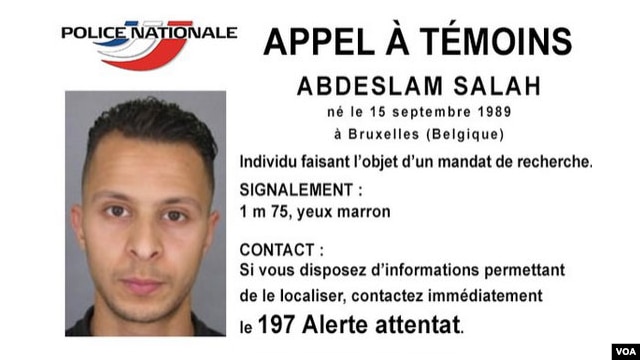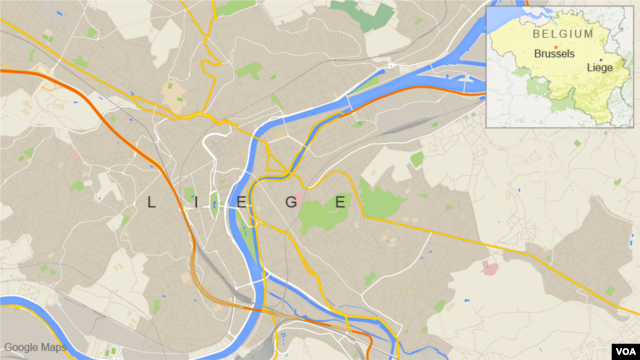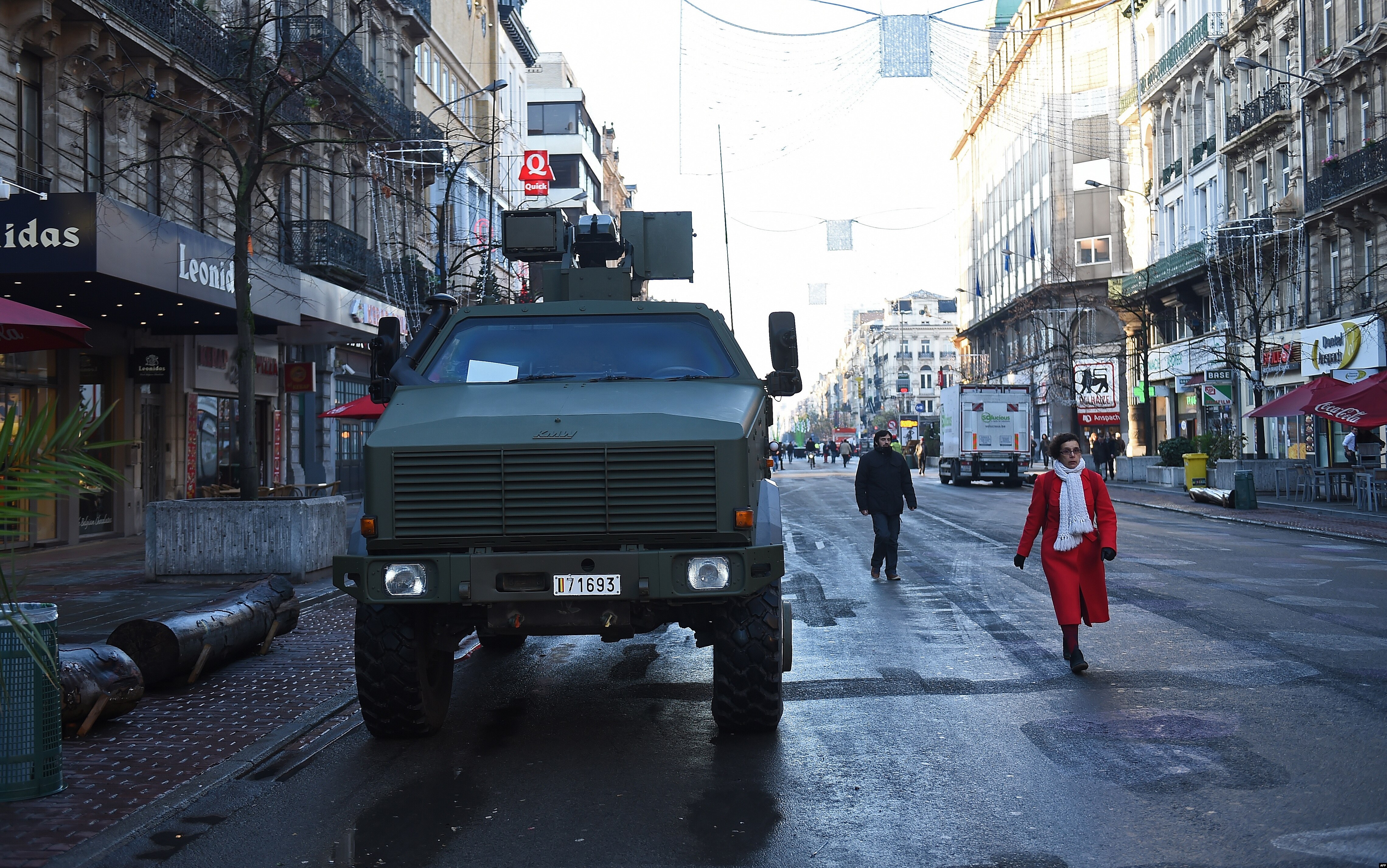
Europe’s Most Wanted Man Eludes Massive Dragnet
BRUSSELS—Suspected Paris attacker Salah Abdeslam evaded a massive manhunt Sunday night involving raids in Brussels and its suburbs, but security forces Monday were also focusing on towns in eastern Belgium, suggesting police fear Europe’s most wanted man might be trying to flee to neighboring Germany.
On the third day of an unprecedented lockdown of the Belgian capital, officials here remain tight-lipped about the biggest security operation mounted in the country since World War II.
On Sunday night, 16 suspects were arrested in more than 19 raids in Brussels and outlying towns to the east and south of Belgium’s capital, which is also home to the main European Union institutions. One of the suspects, who was not named, has been charged in connection with the Paris attacks while 15 others were released. Belgian security officials admitted to VOA they don’t believe they have yet rolled up a terror network they say is planning to mount more attacks similar to those that struck Paris November 13 and left 130 people dead and more than 350 injured.
Belgian media outlets said police arrested four people late Saturday, one possibly wearing a suicide belt. But Geert Schoorens of the federal prosecutor’s office said later he could “neither deny nor confirm” the reports. Authorities addressing reporters Monday did not reference those reports.
Meanwhile, Moroccan authorities say Belgium has formally requested help in tracking a key suspect in the Paris massacres.
A statement from Rabat said Belgium’s King Philippe asked Moroccan King Mohammed for close and intense cooperation in the hunt for Salah Abdeslam, who has avoided arrest since crossing into Belgium from Paris hours after the November 13 attacks.
Salah Abdeslam, a Belgian national French police are searching for in connection with Paris terror attacks. (Police Nationale Handout Photo)
Spotted near German border
Counter-terror units were active Monday in Liège, Belgium, apparently chasing tips that Abdeslam was spotted in a BMW there. Liege is less than a half hour’s drive from the German border and close to the Belgian town of Verviers, where in January Belgian police units were involved in a gunfight with jihadists. A local media outlet reported that the 26-year-old Frenchman and former petty criminal managed to break through a police cordon near Liège, but officials refused to confirm or deny the claim.
If true, the escape from police clutches near Liège would be the second time Abdeslam has been close to capture. Just hours after the Paris attacks, Abdeslam was stopped by French police near the border with Belgium in a car with two other men and was questioned but let go. At the time, his involvement in the attacks was not known, so there was no alert out on him.
Belgian security sources told VOA they believe Abdeslam is receiving help from jihadist networks to evade capture, despite the fact that the fugitive told friends in Skype conversations, according to an ABC News report two days ago, that the Islamic State was unhappy with him after he failed to detonate his suicide vest. They said he was still desperate to get to IS territory in Syria.
Border security tightened
«Intensive border security measures are in place and have been since the Paris attacks,» a German police spokesman told VOA.
Already under a barrage of criticism in Belgium and overseas for intelligence fumbles leading up to the Paris attacks, the country’s counterterrorist agencies appear desperate to shore up confidence in their competence. But the failure to locate Abdeslam is adding to obvious public anxiety.
Eric van der Sypt, Belgium’s public prosecutor, said at a news conference early Monday that a judge would review the detentions of the 16 people arrested on Sunday and a further four detained Saturday night.
All the raids in Brussels and the towns Anderlecht and Charleroi were conducted without incident. But in the Brussels suburb of Molenbeek, where Abdeslam and several of the Paris attackers lived, a car drove directly at security forces, prompting police to open fire. The driver was injured.
Speaking on Belgian television Sunday, Interior Minister Jan Jambon cautioned that the emergency would not be over if and when Abdeslam is found.
«It is a threat that goes beyond just that one person,» he said. «We’re looking at more things. That’s why we’ve put in place such a concentration of resources.»
 People walk past an armoured personnel carrier in Brussels as the Belgian capital remains on the highest possible alert level.
People walk past an armoured personnel carrier in Brussels as the Belgian capital remains on the highest possible alert level.
Most of city shutdown
As the country’s security services intensified their search for a network of Islamic militants believed to be planning a series of attacks on targets in Brussels, many workers stayed at home Monday and businesses closed. Soldiers patrolled streets in the center of Brussels and armored vehicles were deployed outside main stations and in major public spaces.
Authorities indicated at least two militants were at large in the Brussels area who «could commit very dangerous acts.» Some security sources put the figure at closer to eight.
Transport remained severely restricted, with the city’s metro system still suspended and schools shuttered. On Grand Place, the city’s historic central square normally full of tourists and locals, an armored vehicle was parked close to a Christmas tree.
EU institutions were open Monday but with armed troops mounting patrols — many staff were working from home. NATO said its headquarters in the city were open, but some staff were also asked to work from home.
Belgian authorities have urged the public and media not to comment on social media sites about any ongoing police operations they are observing, saying that tweets and Instagram photographs could tip off suspects. Following the lead of a Dutch cameraman, many Belgians have started instead to post pictures of their cats – a surreal expression of humor amid high public anxiety.




